Not all homeless: Monk, migrant workers and refugees get temporary shelter
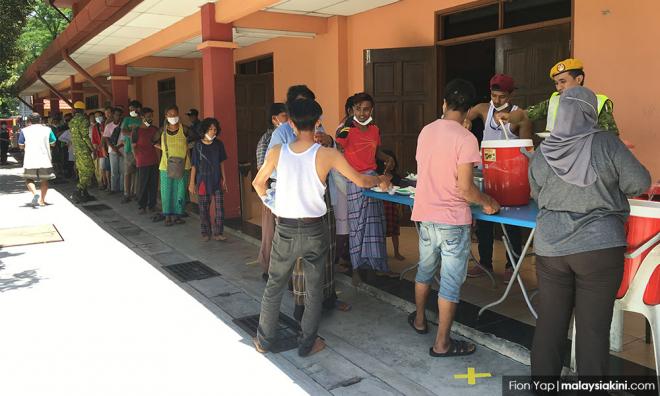
CORONAVIRUS | The Alam Damai multi-purpose hall in Cheras, which is normally reserved for weddings and other events, is now filled with “temporary guests” following the Covid-19 outbreak.
The hall has been transformed into a large dormitory, with mattresses lined up one metre apart, to shelter some 70 foreign people, only some of whom are homeless.
These people are from more than 10 countries including Indonesia, Sri Lanka, Myanmar, Pakistan, Somalia, Japan and the Philippines, among others. Some of them are refugees with UNHCR cards while some are migrant workers who are finding it hard to make a living during the movement control order (MCO) period.
According to the Kuala Lumpur City Hall (DBKL), out of the 71 people currently living in the hall, 57 are men, with 11 being women, two children aged two and seven years and a four-month-old baby.
When the second phase of the MCO started, the DBKL organised an operation to save the homeless and hundreds have been temporarily housed into several halls and community centres.
Foreign monk placed in homeless centre
Malaysiakini paid a visit to the temporary shelter in Cheras last Friday.
All the people at the shelter were already up by 9am. Some were hanging around the yard while some chatted with the Rela officers.
A bespectacled monk in his saffron robe stood out from the others at the shelter.
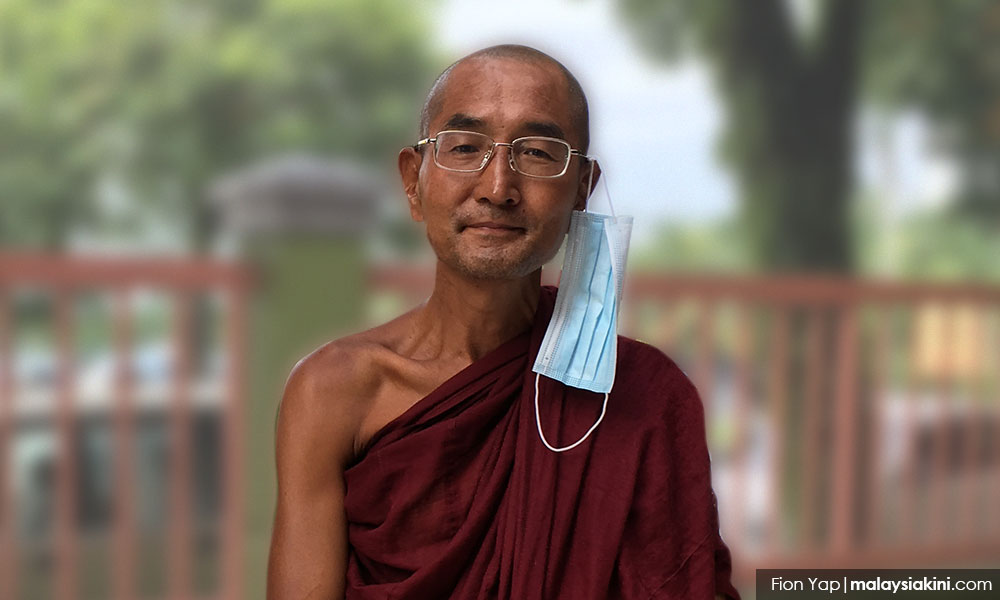
Kim Wang Won (above), originally from South Korea, has been living in Myanmar since becoming a monk 10 years ago and told Malaysiakini that he arrived in Malaysia in the middle of March to study Buddhism at a Burmese Buddhist temple in Subang Jaya. He used to come to Malaysia every two or three years.
Kim was sent to the shelter about 1am on April 1, after he was found by police wandering around KL Sentral, waiting for the Buddhist Maha Vihara, a temple in Brickfields, to open at 5am.
“I don't want to be here, I want to go out. I’m a monk, so I am free, I can go to any temple (to live). But now I know, we were brought here because of the virus,” said Kim, who does not have a phone and seldom contacts others.
“It’s a bit difficult here, but it’s okay. Every day I will study and meditate.”
'I felt it was better not to fight the police'
For Indonesian tour guide Ratna, she was taken away by the police after being mistaken as a homeless person when she went to visit the house she was about to move into while carrying luggage.
“When I arrived here (at the shelter) and I explained my situation to them (the authorities), they asked me why I didn't tell the police when I was caught.
“Actually I did, but the police said I broke the (MCO) and grabbed my bags. I felt that it was better not to fight them, so I just followed.
“After that, they wanted me to stay here for 14 days. Since they can ensure my safety and provide meals, I’ll just stay,” Ratna said.
Impoverished migrant worker willingly arrested by police
On the same day, representatives from DBKL, the Immigration Department and police took turns to come and understand the situation of the people at the shelter as well as to record their personal details.
After the authorities left, it was time for lunch. The atmosphere of the hall became lively with people chatting in different languages. Some of them seemed defensive when the media approached, but most of them smiled and were willing to share their stories.
Ki Raung Do Raung (below), 21, from Myanmar has been in Malaysia for seven years and works in a barbershop, with a monthly salary of about RM1,500. His employer rents a room for him in Dengkil.
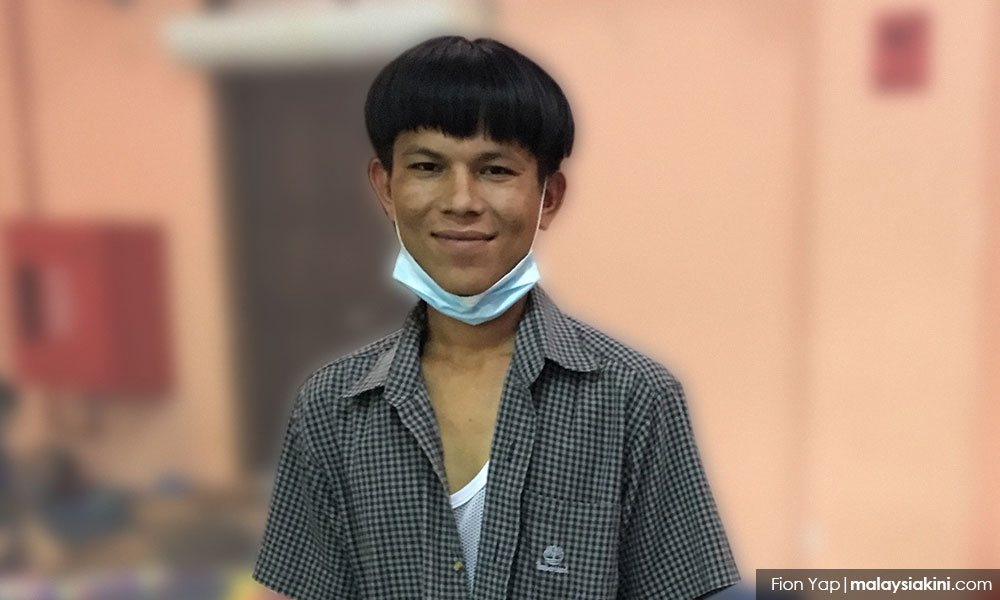
Ki Ruang told Malaysiakini he has little money left since he could not go to work for half a month due to the MCO. As such he did not return to Dengkil and was wandering around in KL to get some food from NGOs.
When he saw the police were taking homeless people from the streets, Ki Raung let himself be arrested.
“I had no money already, so I voluntarily let the police arrest me. I couldn’t buy food and it would be hard to go back home.”
Ki Raung was robbed of his mobile phone when he went to Kota Raya to send money to his mother several days ago, just before he was brought to the shelter. He said he can only get a new one if he works for a month.
During the interview, the others at the hall were seen mopping the floor. Over the past few days, they have helped to clean the hall and worked with Rela officers to distribute the necessary supplies and meals.
Indonesian family with baby boy
Except for those who were mistakenly brought in, there were also people who were indeed homeless.
An Indonesian couple, Orep and Matsura (below), live in a separate room behind the hall with their four-month-old son.
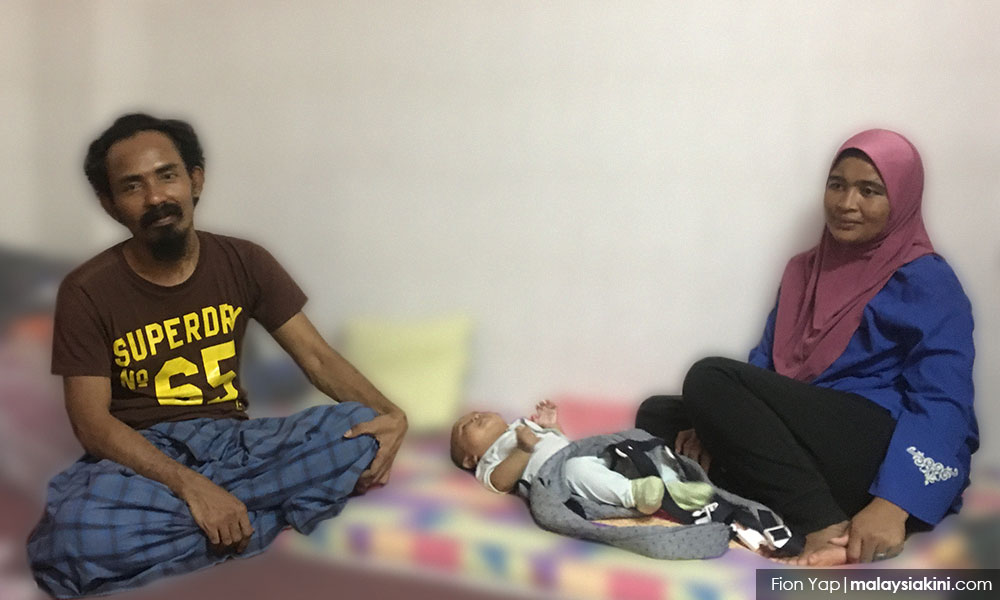
Before being brought to the shelter, the family of three camped out near Nu Sentral. After the baby was born, Orep had no choice but to sell his phone to buy food for his newborn son.
This made him lose contact with some distant relatives in Malaysia.
Orep said he and his wife have stayed in Malaysia for two years and had spent more than RM5,000 on applications for work permits.
Since they are here on a travel visa, they need to return to Indonesia regularly before re-entering Malaysia. At times, they would go to Segamat to stay at a distant relative's home.
Orep has worked some odd jobs here and said that the salary is better than in his hometown, Madura, where at least a daily income can be offset by expenses, with some balance left.
Asked about the living conditions in Alam Damai, Orep thanked the authorities for providing them with nappies and baby clothes.
He also praised the Malaysian government for implementing the MCO to combat the deadly Covid-19 virus, as well as housing all the homeless regardless of their nationalities.
However, Orep wished they could go back to Johor as soon as possible.
“Of course we have no freedom when staying here. We are not allowed to go out and we cannot go back to Johor. But compared to sleeping on the streets, it’s better to be here.”
Diabetic man cannot eat biscuits given for breakfast
Padmanathan Shelton (below), a 37-year-old Sri Lankan man, has been sleeping rough in Kuala Lumpur for the past eight years.
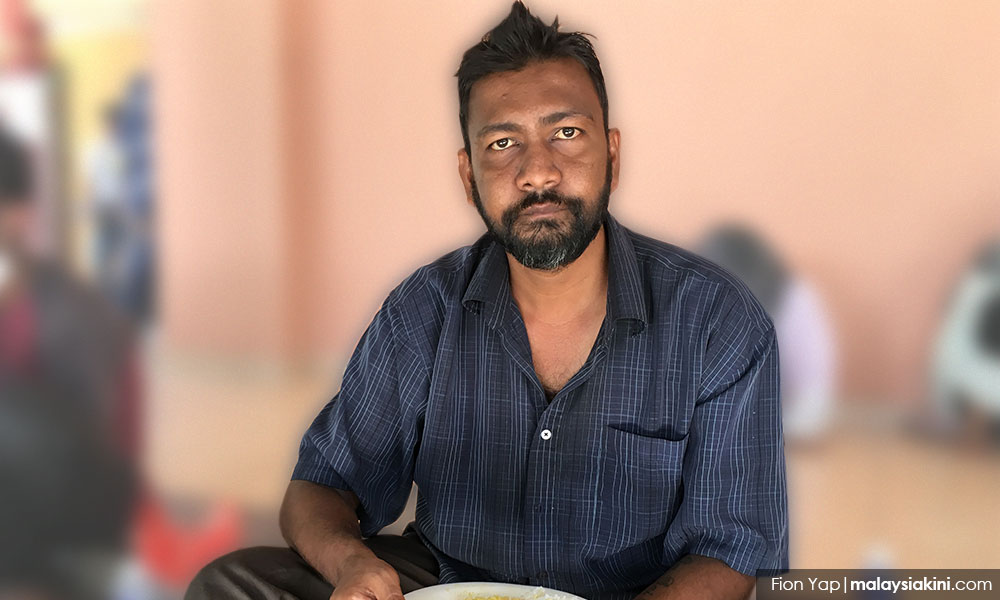
After the war broke out in his hometown, he came to seek refuge in Malaysia. Although he has a UNHCR card, he finds it hard to get a formal job as Malaysia does not allow refugees to work.
However, he echoed Orep in applauding the government’s decision to house the homeless.
Nevertheless, Padmanathan complained that he does not have enough clothes to change. According to him, the shirt and jeans he was wearing were his only clothes.
“My bag was stolen at KL Sentral last week, I lost all my clothes, my phone and my UNHCR card, after that I slept near the KL Sentral. I still remember my UNHCR card number and I told the Immigration Department officers when they asked me.”
He also mentioned that as a person suffering from diabetes, he could not eat the biscuits which were provided for breakfast.
Apart from Padmanathan, Ki Raung also said he could not eat the biscuits due to his gastric problem.
DBKL contacting embassies for help
KL mayor Nor Hisham Ahmad Dahlan (below, left) also visited the hall on the same Friday morning. In addition to distributing face masks to the people at the shelter, he also asked about their nationalities and their purpose of visit.
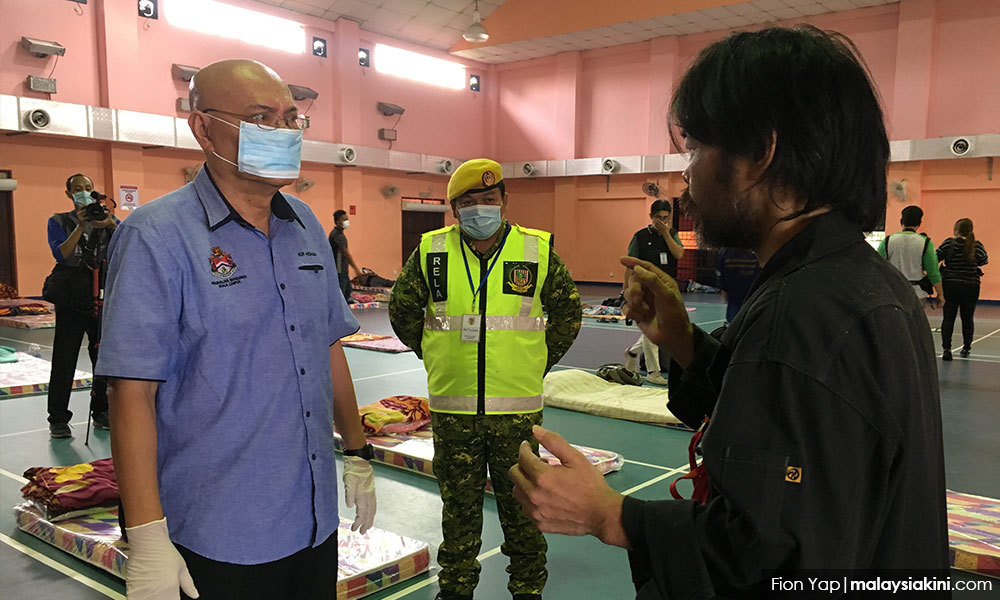
According to Nor Hisham, all the residents have been checked by the Health Ministry for Covid-19 and all of their results have turned out negative.
Nor Hisham also said DBKL was contacting embassies to seek help for the foreign people.
“As we saw just now, there are kids and even a baby here. We will inform the respective embassies to see if they can help their citizens here.”
The management team of the Alam Damai hall told Malaysiakini that the NGO Kembara Kitchen is in charge of providing food to the people there.
The food will be checked by the Health Ministry each time before being distributed to the vulnerable group.
DBKL also gave out clothes and towels to them on the same day.
Since last Wednesday, some 510 homeless people have been housed in two transit centres and four community centres around Kuala Lumpur under a DBKL mission to track them down and keep them safe during the MCO.
Nor Hisham said that besides the homeless transit centre on Jalan Pahang and Anjung Singgah, four community centres and multipurpose halls under the city council – the Sentul Perdana and Setiawangsa community centres as well as the Alam Damai Cheras and Tasik Ampang Hilir multi-purpose halls – have also been turned into temporary shelters. - Mkini
✍ Credit given to the original owner of this post : ☕ Malaysians Must Know the TRUTH
🌐 Hit This Link To Find Out More On Their Articles...🏄🏻♀️ Enjoy Surfing!



















Post a Comment